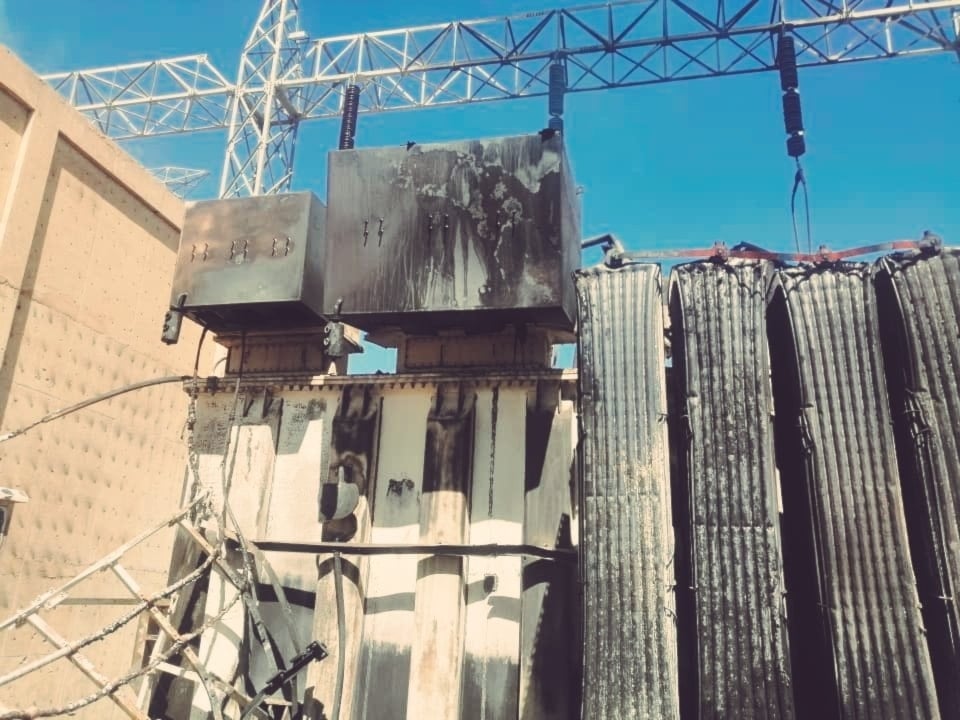Sudan plunged into darkness as drone strikes target key power stations
The initial strikes targeted the Merowe Dam, Sudan's largest power generation facility, disrupting electricity in the northern state.
-

Destruction of the Al-Shouk power station leads to power outages in Kassala and Gedaref. (@MOSABIMO2)
Most regions under army control in Sudan are experiencing widespread blackouts following a series of drone strikes carried out by the paramilitary Rapid Support Forces (RSF). These attacks, which began last week, have severely impacted critical power facilities, deepening the country's humanitarian crisis.
The initial strikes targeted the Merowe Dam, Sudan's largest power generation facility, disrupting electricity in the northern state. A technical failure also affected power supplies in River Nile and Red Sea states. The outages spread further on Saturday after an overnight assault on the al-Shouk power station, cutting power to Gedaref, Kassala, and Sennar states. These areas represent a significant portion of territory still held by the army amid its nearly two-year-long conflict with the RSF, which controls much of western Sudan.
تدمير محطة #الشوك التحويلية ى إنقطاع الكهرباء في كسلا، القضارف.
— Mosab مصعب (@MOSABIMO2) January 18, 2025
مسيرات الإمارات لتدمير السودان و تركييع الشعب السوداني.
إلا يعلم الدعم السريع مقرات الفرق العسكرية ؟
إنها ليست بين جنرالين كما روج لها الزراع السياسي لهذه المليشيات المدعومة امارتياً ، إنها حرب ضد الشعب السوداني. pic.twitter.com/nryoAclFOa
ما زال استهداف البنية التحتية للدولة مستمرًا من قِبَل قوات الدعم السريع، حيث استهدفت المحطة التحويلية في القضارف، مما تسبب في انقطاع الكهرباء عن ولايات القضارف وكسلا وسنار. pic.twitter.com/6gIsO4GLTL
— Hisham. 🇸🇩🇵🇸 (@Hisham2001S) January 18, 2025
The RSF's actions have compounded existing challenges, as many RSF-controlled regions already suffer from diminished electricity due to ongoing violence. In areas now plunged into darkness, millions of internally displaced people are grappling with deteriorating infrastructure and overcrowded conditions.
Human rights group Emergency Lawyers has raised alarm over the repercussions of these strikes. "The attack on the power station led to the disruption of electricity to hospitals, schools, and water facilities, which threatens civilian lives particularly in these difficult humanitarian circumstances," the group said. "These attacks do not only deprive civilians of their basic rights, they increase the risk of escalated violence," it added.
The crisis is putting additional pressure on vulnerable communities, as food insecurity and limited resources worsen. In Omdurman, part of the greater Khartoum area, residents reported that bakeries have been forced to close, and many people are resorting to drawing water from the Nile River. Efforts are underway to repair the Merowe power station, but engineers have yet to restore its functionality, sources revealed.
Read more: Sudanese army recaptures Wad Madani from Rapid Support Forces
Golden conflict
Sudan has been embroiled in a devastating civil war since April 2023, marked by intense conflict between the Sudanese Armed Forces (SAF) and Rapid Support Forces (RSF). This brutal power struggle has resulted in over 24,000 deaths and displaced more than 14 million people, creating one of the world's most severe humanitarian crises.
Both factions stand accused of committing war crimes, including attacks on civilians and critical infrastructure. The conflict is further fueled by Sudan's abundant gold resources, which both sides exploit to fund their military operations, attracting international attention and concern.
In response, the US has imposed sanctions on the leaders of both factions in an effort to encourage compromise. On January 7, sanctions were placed on Mohamed Hamdan Dagalo (Hemedti) and the RSF for human rights violations. On January 16, Abdel Fattah al-Burhan and SAF-linked entities, including a procurement network tied to Ahmad Abdalla, were similarly sanctioned.
Al-Burhan maintains close ties with Egypt, which views Sudan as a critical ally in Nile water disputes. Meanwhile, Hemedti has secured support from the UAE, capitalizing on his control of Sudan's lucrative gold trade. These alliances place two key US partners—Egypt and the UAE—on opposing sides, complicating Washington's ability to adopt a clear and decisive policy toward the conflict.
Read more: UAE hides weapons behind aid to fuel conflict in Sudan: NYT

 3 Min Read
3 Min Read








